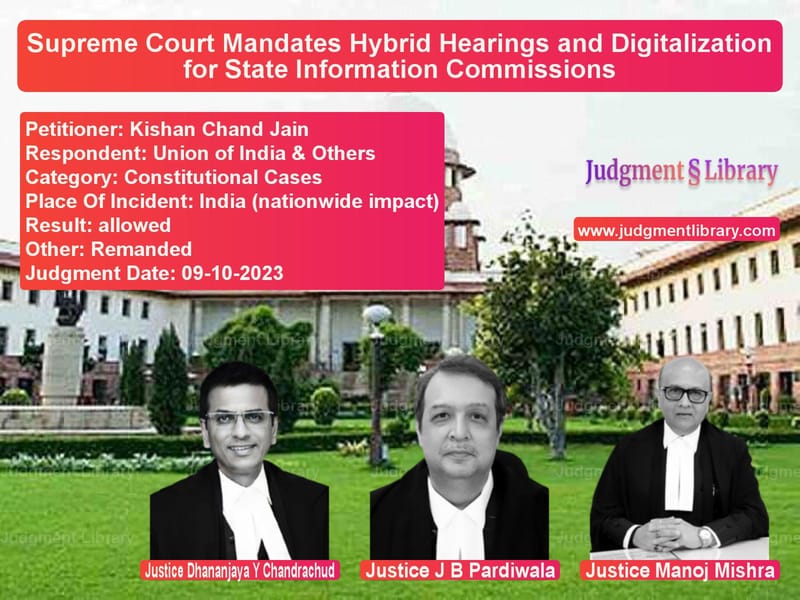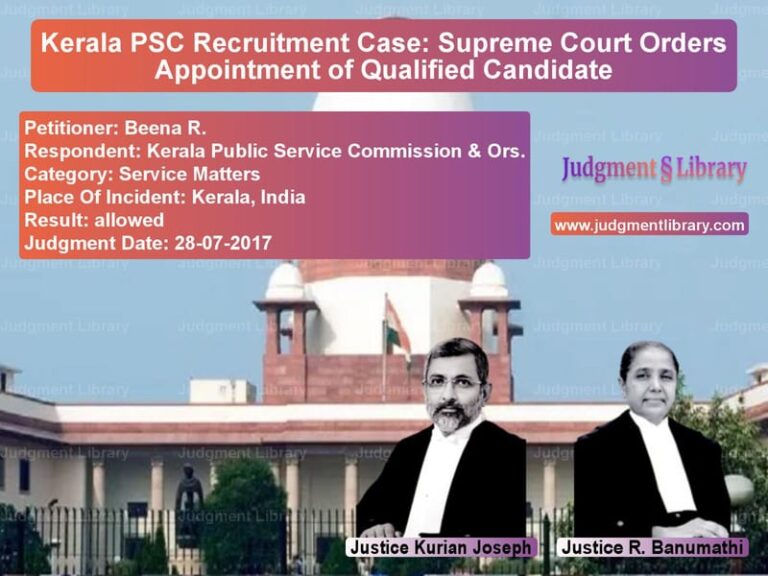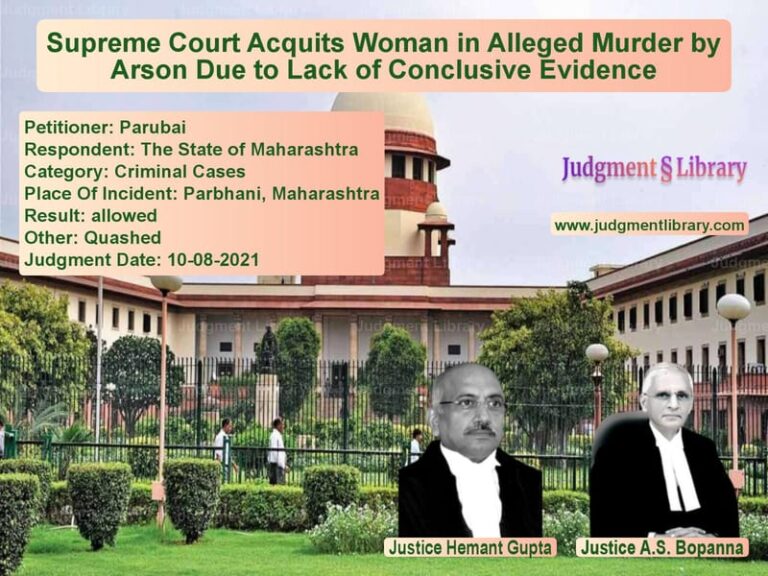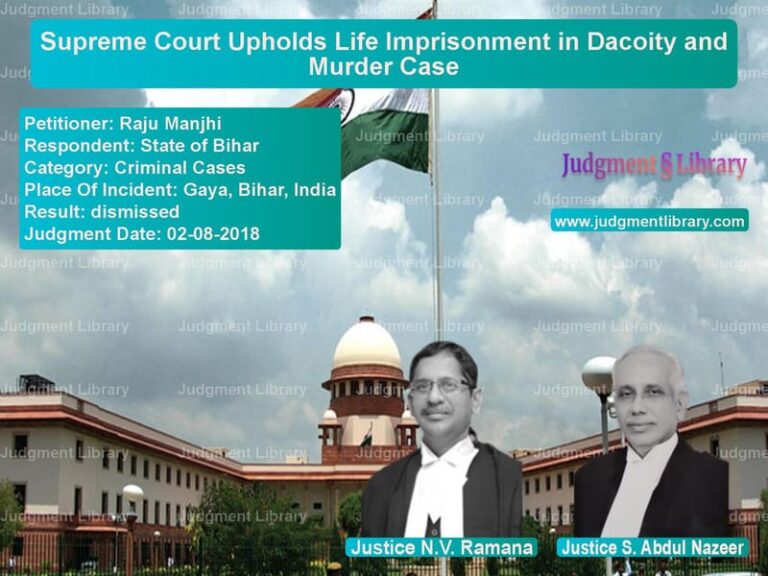Supreme Court Mandates Hybrid Hearings and Digitalization for State Information Commissions
The Supreme Court of India, in a significant ruling, has directed all State Information Commissions (SICs) to implement hybrid hearing modes and enhance their digital infrastructure to ensure better access to justice under the Right to Information Act, 2005 (RTI Act). The judgment, delivered in the case of Kishan Chand Jain v. Union of India & Others, underscores the necessity of technology-driven transparency and accountability in governance.
Background of the Case
The petitioner, Kishan Chand Jain, filed a writ petition under Article 32 of the Constitution, seeking judicial intervention to improve the functioning of SICs across India. The petition highlighted several deficiencies in SICs, including the lack of virtual hearing facilities, the absence of online filing mechanisms, and delays in disposing of RTI appeals and complaints.
The petitioner contended that:
- The SICs operate primarily from state capitals, making access difficult for citizens from remote areas.
- Most SICs do not have an online filing mechanism, unlike the Central Information Commission (CIC).
- There is an urgent need for virtual hearings to facilitate cost-effective and efficient proceedings.
- SICs should be mandated to impose penalties on defaulting Public Information Officers (PIOs) under Section 20(1) of the RTI Act.
Key Legal Issues
- Whether SICs should be required to provide hybrid (virtual and physical) hearings.
- Whether SICs should implement a digital filing system for RTI appeals and complaints.
- Whether a uniform standard should be set for disposing of RTI appeals within a fixed timeframe.
- Whether penalties should be mandatorily imposed on PIOs for wrongful denial of information.
Arguments by the Petitioner
The petitioner, through legal counsel, argued:
- The legislative intent of the RTI Act is to make information accessible at a reasonable cost. Virtual hearings would help achieve this objective.
- Without an online appeal and complaint filing system, many citizens are effectively deprived of their right to information.
- Several SICs are operating inefficiently, with excessive delays in disposing of appeals and complaints.
- There is a lack of accountability as SICs often fail to impose penalties on PIOs who refuse to disclose information.
Arguments by the Respondents (Union of India & State Governments)
The respondents, represented by the Additional Solicitor General, countered:
- Many SICs have already started implementing virtual hearing facilities.
- The implementation of digital platforms for filing appeals is a state subject and requires financial resources.
- Some SICs follow different procedural norms due to regional and logistical constraints.
- Uniform time-bound disposal of cases is not feasible given the varying workloads across different SICs.
Supreme Court’s Observations
On the Right to Information and Access to Justice
The Court emphasized that the RTI Act serves as a fundamental tool for transparency and accountability:
“The RTI Act pursues the legitimate state aim of ensuring transparent and accountable government. The right to information is not merely a statutory right; it has been recognized as a constitutional right under Articles 14, 19(1)(a), and 21.”
On the Need for Hybrid Hearings
The Court recognized that SICs, being quasi-judicial bodies, must ensure access to justice:
“It is a constitutional duty of every adjudicatory institution, whether courts, tribunals, or commissions, to adopt technological solutions such as video-conferencing and make them available to litigants on a regular and consistent basis.”
On Digitalization of RTI Processes
The Court highlighted the need for digital portals and directed:
- All SICs must develop a centralized digital portal for online filing of RTI appeals and complaints.
- The digital portal must provide real-time case status, daily orders, judgments, and cause lists.
- All SICs must upload their annual reports in compliance with Section 25 of the RTI Act.
On Timely Disposal of RTI Appeals
The Court acknowledged the need for efficiency and directed that:
- SICs must dispose of complaints and appeals within a fixed timeframe, preferably within four months.
- Norms must be set for each Information Commissioner to dispose of a stipulated number of cases per day.
On Imposition of Penalties
The Court reiterated the mandatory nature of penalties under Section 20(1) of the RTI Act:
“SICs must ensure that erring information officers are penalized for wrongful denial of information. The failure to impose penalties amounts to dilution of the RTI Act.”
Final Judgment
The Supreme Court issued the following directives:
- All SICs must provide hybrid hearing facilities by December 31, 2023.
- Online filing of RTI appeals and complaints must be made operational across all SICs.
- All State Governments must allocate funds to SICs to upgrade their digital infrastructure.
- The Secretary, Department of Personnel and Training, must convene a meeting with all SICs within one month to finalize the implementation process.
- Failure to comply with these directives will invite contempt proceedings.
Impact of the Judgment
This ruling is a landmark step toward enhancing transparency and accountability in government operations. The key takeaways from the judgment are:
- Citizens will have better access to SICs through virtual hearings.
- The digitalization of RTI processes will streamline case management.
- The enforcement of penalties will ensure stricter compliance with RTI obligations.
- The judgment strengthens the right to information as a fundamental right.
Conclusion
The Supreme Court’s judgment ensures that SICs are better equipped to handle RTI appeals and complaints efficiently. By mandating virtual hearings, digital filing, and timely disposal of cases, the ruling empowers citizens and reinforces the constitutional right to information. The decision is a significant step toward a more transparent and accountable governance framework in India.
Read also: https://judgmentlibrary.com/supreme-court-rules-in-favor-of-oci-student-in-neet-pg-admission-case/
Petitioner Name: Kishan Chand Jain.Respondent Name: Union of India & Others.Judgment By: Justice Dhananjaya Y Chandrachud, Justice J B Pardiwala, Justice Manoj Mishra.Place Of Incident: India (nationwide impact).Judgment Date: 09-10-2023.
Don’t miss out on the full details! Download the complete judgment in PDF format below and gain valuable insights instantly!
Download Judgment: kishan-chand-jain-vs-union-of-india-&-oth-supreme-court-of-india-judgment-dated-09-10-2023.pdf
Directly Download Judgment: Directly download this Judgment
See all petitions in Fundamental Rights
See all petitions in Public Interest Litigation
See all petitions in Separation of Powers
See all petitions in Legislative Powers
See all petitions in Workplace Harassment
See all petitions in Judgment by Dhananjaya Y Chandrachud
See all petitions in Judgment by J.B. Pardiwala
See all petitions in Judgment by Manoj Misra
See all petitions in allowed
See all petitions in Remanded
See all petitions in supreme court of India judgments October 2023
See all petitions in 2023 judgments
See all posts in Constitutional Cases Category
See all allowed petitions in Constitutional Cases Category
See all Dismissed petitions in Constitutional Cases Category
See all partially allowed petitions in Constitutional Cases Category







